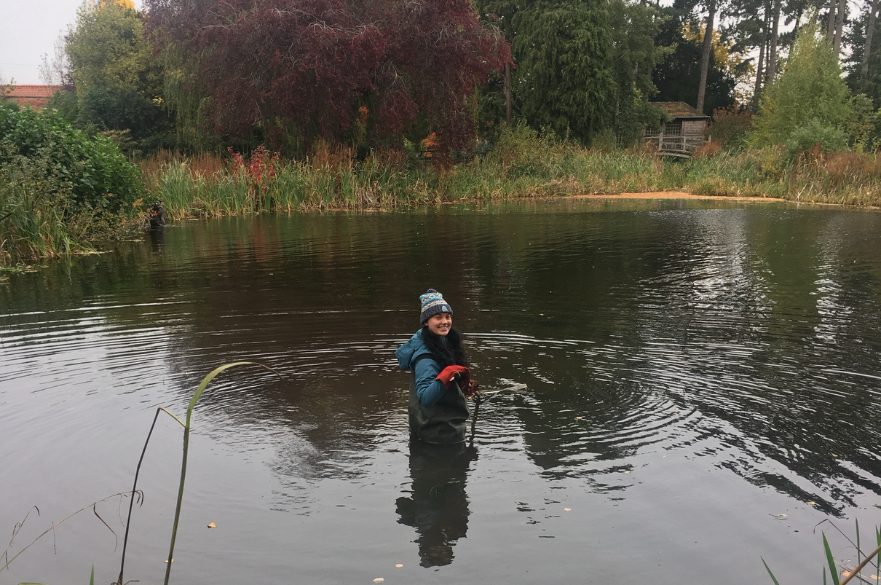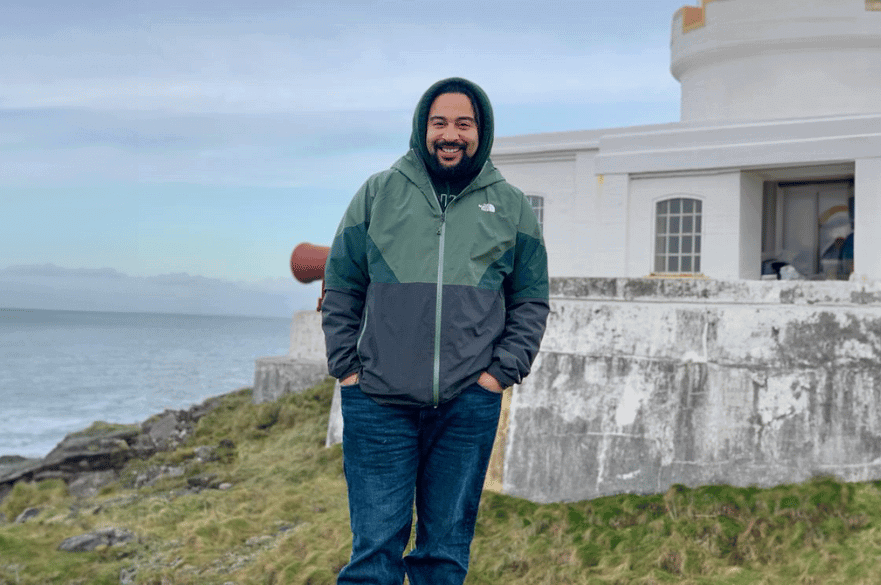
I enjoyed the variety of taught material as well as the freedom to study what you find the most interesting.
More about Rachel
Why did you choose to study your course at NTU?
I chose to study at NTU because Nottingham is easily accessible from all over the UK. The Brackenhurst Campus, at which my course is taught, is also absolutely beautiful and instantly felt like a home from home. I think that Southwell is a lovely town and has volunteering opportunities such as the Potwell Dyke Grasslands Action Group.
What did you enjoy most about your course?
I enjoyed the variety of taught material as well as the freedom to study what you find the most interesting. My lectures had a great variety of teaching methods incorporated within them and we were encouraged to work with our course mates often which is good for improving our team working skills. I loved the Wales field course at the start of my final year because I was able to put all of my ecological knowledge to the test in a new environment and made lots of new friends!
Tell us more about your placement(s) and the projects you were involved with. What did you do and what did you achieve?
I completed a year placement with Manx Wildlife Trust on the Isle of Man. The first stand-out project I was involved in this year was a feasibility study into the reintroduction of freshwater pearl mussels. This endangered bivalve went extinct on the Isle of Man in the early 1900s for reasons unknown, and the project hopes to one day bring them back. I investigated the water quality patterns of all monitored rivers on the Island, writing a report about my findings. I included maps to display my data and recommendations for what needs to happen next.
I assisted with tree planting sessions and helped manage volunteers at the Hairpin Woodland Park, including the creation of the brand new ‘Logstickle Course’! I had a fantastic time building steps and balance beams, which made me feel more confident in my practical working abilities.
When I started with MWT, I soon realised that my knowledge of GIS (Geographic Information Systems – a mapping computer software) would benefit the team. Having learnt about the software in my second year at university, I was eager to put my skills into practice. I have been able to digitise maps from the archives, update maps of the reserves and help with planning permission forms. I even taught a couple of staff members the basics!
Another project that I took the lead with was the annual carbon emission audit. I had to gather information on MWT’s fuel consumption, waste, material use and the livestock we were responsible for. As a part of this project, I designed a comprehensive form for all staff members to fill out so that the data is easier to gather in the future and sent feedback on the ease of the process to the central Wildlife Trusts team.
How did your placement(s) help with your personal development and your study?
Since returning from placement, I see myself as a new person. I am looking at my peers as colleagues and thinking about how we can all work together to improve our future employability. For example, I have recently set up a debate club in order to discuss conservation topics with my peers, improve our critical thinking skills and develop our self-confidence. To do this effectively, I reached out to the NTU Debate Society who provided me with advice. It is evident that I have learnt how to utilise all the tools at my disposal!
Looking back on my year with MWT, I realise how much I have developed. My confidence has certainly grown, as has my knowledge of wildlife conservation, both practically in the field and behind the scenes in terms of legislation and planning.
Not only have I learnt about how important it is to maintain strong communication within the workplace, but in terms of conservation goals, how important it is to collaborate with the public.
It is because of this that I applied for, and was offered, a role within the Isle of Man UNESCO Biosphere team as a Youth Representative. It is now my role to engage with the youth of the Island and collaborate with those who want to get involved. I will also be sitting in on the UNESCO Biosphere Stakeholder Partnership Group which will further help connect valuable organisations, including the Manx Wildlife Trust, with whom I completed my placement.
Why would you recommend your course to someone considering studying it?
I would absolutely recommend this course. There has been a broad range of topics covered, allowing me to discover new ideas and learn more about the things that interest me the most.
I have no complaints about the teaching of this course, all of my lecturers have been great and the field courses especially helped to bond the groups of students and staff together. This created a community within the course that not many courses can relate to due to their size.
Living on Brackenhurst, it is easy to forget that you have access to the wider range of NTU buildings such as those in the City and on Clifton campus. I recommend that students on the Ecology and Conservation course attempt to make the most of these resources and form connections with other groups of students as who knows where these connections can take you!
What have you been up to since graduating?
Since graduating last year, I've been incredibly busy! I've worked in a variety of roles, from administration to youth engagement, and have recently settled into a position as an Exexutive Officer in the Isle of Man Goverment Energy Policy team. My work focuses on developing a scheme to help households transition to low-carbon heating as part of the transition to net-zero. I love this role because it gives me insight into the inner workings of government while making a real difference to people's lives - not just in terms of health and the economy, but also for our climate.
Alongside this, I have a zero-hour contract with Manx Wildlife Trust as a Field Assistant for their ecological consultancy. I help conduct bat, bird, invertebrate and amphibian surveys and have even contributed to mapping projects using my GIS skills.
Volunteering has also been a huge part of my life. I work with the Manx Bat Group, checking bat boxes and setting up stationery bat detectors, and I volunteer with the Manx Wildlife Trust as an official mammal verifier on iRecord, with hopes of delivering citizen science projects on the Isle of Man in the future. My main volunteering commitment, however, is with Biosphere Isle of Man, where I serve as the youth representative. This role involves representing young voices in our stakeholder partnership group and finding ways to engage more young people (a passion that first sparked when I was a Course Rep at NTU!). Through this work, I founded a youth network on the Isle of Man, bringing together people aged 18-35 who are passionate about our biosphere reserve. This initiative has since grown, and I am now the UK and Ireland Biosphere Reserve Youth Representative, leading the development of the first youth network spanning UNESCO sites across the UK, Ireland, and the Isle of Man. We held our first youth forum in March 2025!
What does your current day involve?
Everyday is different when working on projects. I usually start by going through my to-do list and preparing for any meetings I have scheduled. I also spend a lot of time on research and reading. Recently, I have been planning the process map for the new low-carbon heating scheme and drafting a short paper on the requirements and next steps to ensure quality installation by the contractors involved. It's challenging work that requires creative thinking, but I know it will be worthwhile in the end!
In the evenings, I often volunteer - whether it's attending meetings, working on documents, or organising social events for the youth network.
What attracted you to this field?
There aren't many roles in ecology on the Isle of Man to be honest! I knew that working in the Isle of Man Government Department of Environment, Food and Agriculture would give me a deeper understanding of the Island and give me knowledge I would need for postgraduate study on the Island's ecology, but I ended up in Energy Policy by chance. It is a lot different to the topics I studied at NTU, but I absolutely love it. In fact, I think I've discovered a type of work that really interests me - I enjoy the idea of having a varied role in government as a civil servant working in environmental policy.
What have been the highlights and biggest challenges of your career so far?
The biggest highlight of my career so far has been the nine-week placement with Biosphere Isle of Man. I had the opportunity after attending a conference as part of my volunteering work as a youth representative. I had so many ideas and so little time to execute them, so I proposed the role to the delivery team, and they were able to set it up for me. During this time, I completed a full evaluation of current levels of youth engagement with Biosphere and net zero, delivered a workshop to a group of 20 members of the public, and presented to an assembly of high school students. I also used this opportunity to plan and deliver the official launch event for the youth network.
The biggest challenge was delivering the workshop. Public speaking has always been my worst enemy. I started trying to overcome this during my time at NTU, where I spoke in front of second year students about my placement experience, set up a debate club, and spoke about my course at open days for prospective students and their parents. It never got much easier but I kept pushing myself.
Delivering the workshop made me realise how vital public speaking is in sharing my passion with others. I was inspired by the late Claire Lomas MBE. During my final weeks at NTU, she spoke about how difficult public speaking had always been for her, but how the importance of what she needed to share outweighed any fear. I'll never forget the impact her talk had on me and how it showed me that anything is possible with hard work and determination.
What are your plans for the future?
I've never felt so inspired by my island and I hope to one day contribute research that enhances the understanding of our ecology. Majorly exciting, I will be back to Brackenhurst in September! I am returning to study my MRes in Applied Ecology and Geospatial Techniques. So I hope to do exactly that and learn more from industry professionals along the way in how I can make my dreams a reality.
Finally, is there anything else you'd like to share with our student and alumni community?
I'd love to connect! Reach me on LinkedIn for a cuppa and a chat. Nothing inspires me more than hearing about how other alumni are getting on.
Still need help?
-

STUDENT PROFILE
Ajay Tegala
Ecology and ConservationUnited Kingdom
https://www.ntu.ac.uk/study-and-courses/courses/our-students-stories/animal-rural-environmental-sciences/ajay-tegala
-

STUDENT PROFILE
Ajay Uniyal
Food Science and TechnologyIndia
https://www.ntu.ac.uk/study-and-courses/courses/our-students-stories/animal-rural-environmental-sciences/ajay-uniyal
-

STUDENT PROFILE
Bejohn Quigley
Ecology and ConservationUnited Kingdom
https://www.ntu.ac.uk/study-and-courses/courses/our-students-stories/animal-rural-environmental-sciences/bejohn-quigley